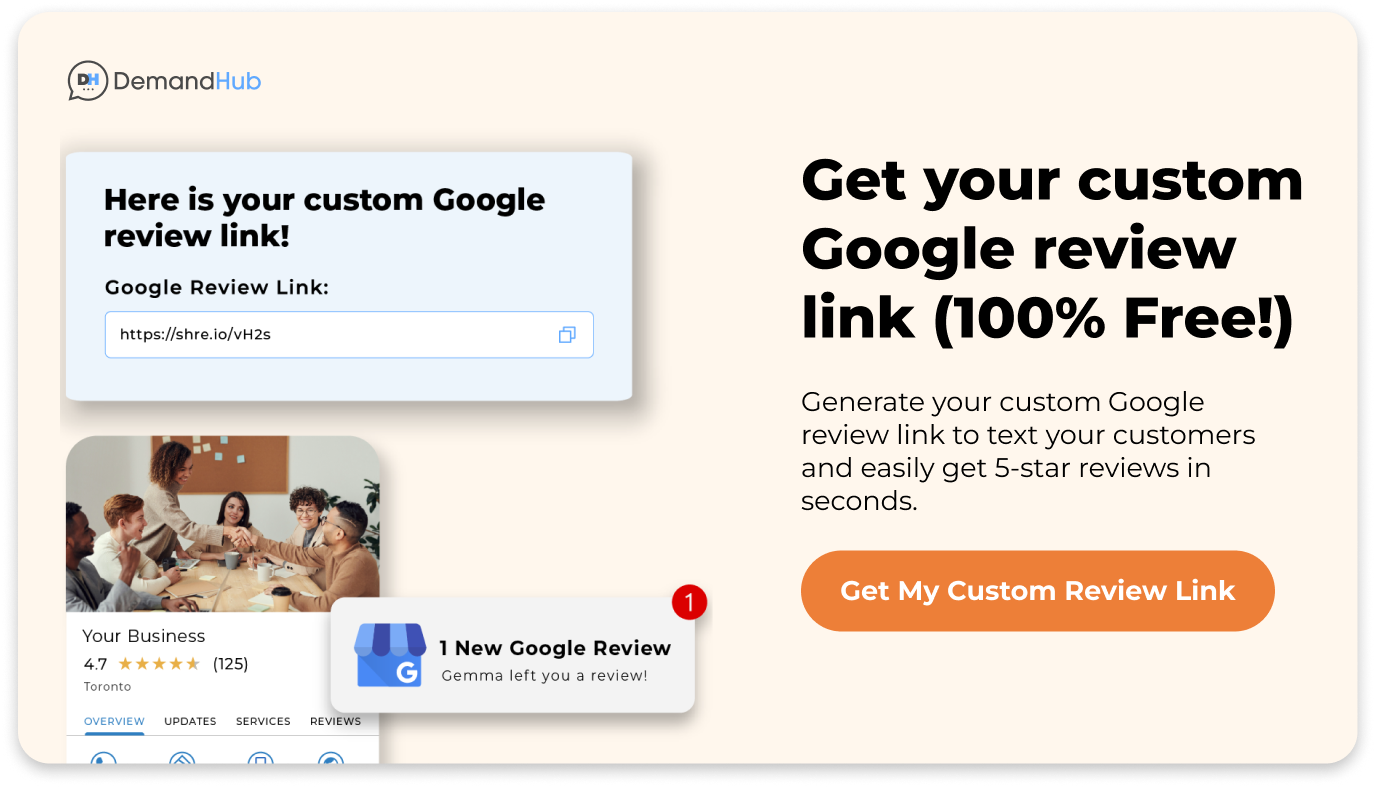7 Best EHR Platforms to Supercharge Your Healthcare Practice in 2024

88% of office-based physicians in the U.S. use an EHR system.
New digital EHR Systems are transforming the way we manage patient care.
Electronic Health Record (EHR) systems are at the heart of this transformation. These powerful tools are not just about digitizing patient records - they’re about supercharging your healthcare practice, streamlining operations, and delivering patient care like never before.
In this blog post, we’re spotlighting 7 of the best EHR platforms making waves in 2024. So, buckle up, and let’s embark on this journey to discover how these platforms can turbocharge your practice.
Table of Contents- What is an EHR System?
- What is the Difference Between an EHR and EMR?
- Key Factors to Consider When Choosing an EHR Management Platform
- 7 EHR Platforms to Supercharge Your Healthcare Practice in 2024
- Picking a system can be challenging
- Frequently Asked Questions (FAQs) About EHR Platforms
What is an EHR System?
An Electronic Health Record (EHR) is a digital system healthcare practices use to manage patient information. It’s essentially a digital version of a patient’s traditional medical records.
EHR platforms typically include a wide range of data, such as a patient’s medical history, diagnoses, medications, treatment plans, immunization dates, allergies, radiology images, and laboratory and test results.
EHR platforms go beyond the standard clinical data collected in a doctor’s office. They provide a comprehensive view of a patient’s healthcare journey.
EHRs can:
- Enable access to evidence-based tools that physicians can use to make patient treatment decisions.
- Automate and streamline provider workflow.
- Offer a holistic view of a patient’s health by including information from all clinicians involved in a patient’s care.
A standout feature of an EHR platform is its ability to allow approved healthcare providers to generate and oversee health data in a digital form. This data can then be securely exchanged with other healthcare providers across multiple organizations.
This means that a patient’s medical information can be shared securely with other healthcare providers, such as specialists or hospitals, leading to more coordinated, patient-centered care.
What is the Difference Between an EHR and EMR?
Electronic Health Records (EHRs) and Electronic Medical Records (EMRs) are both digital versions of a patient’s medical history, but there are some key differences between the two.
Scope and Depth of Information
An EMR is a digital version of a patient’s medical history in a single doctor’s office. It contains the patient’s medical and treatment history in one practice.
On the contrary, an EHR is a more holistic record of the patient’s overall health and includes information from all the clinicians involved in a patient’s care.
EHRs are developed to be shared with other providers, so they can contain information from all of a patient’s healthcare providers.
Interoperability
EMRs are typically limited to the practice where they were created. They are not easily shared with other healthcare providers.
EHRs, however, are designed to be shared with other healthcare providers to provide a more holistic view of a patient’s health. This can include sharing information with laboratories, specialists, medical imaging facilities, pharmacies, emergency facilities, and school and workplace clinics, among others.
Patient Involvement
EHRs often have features that allow patients to access their own records, schedule appointments, request prescription refills, and communicate with their healthcare providers. EMRs typically do not have these patient-facing features.
In summary, while both EMRs and EHRs are digital records of patient health information, EHRs are more comprehensive and are designed to be shared with other healthcare providers to provide coordinated, patient-centered care.
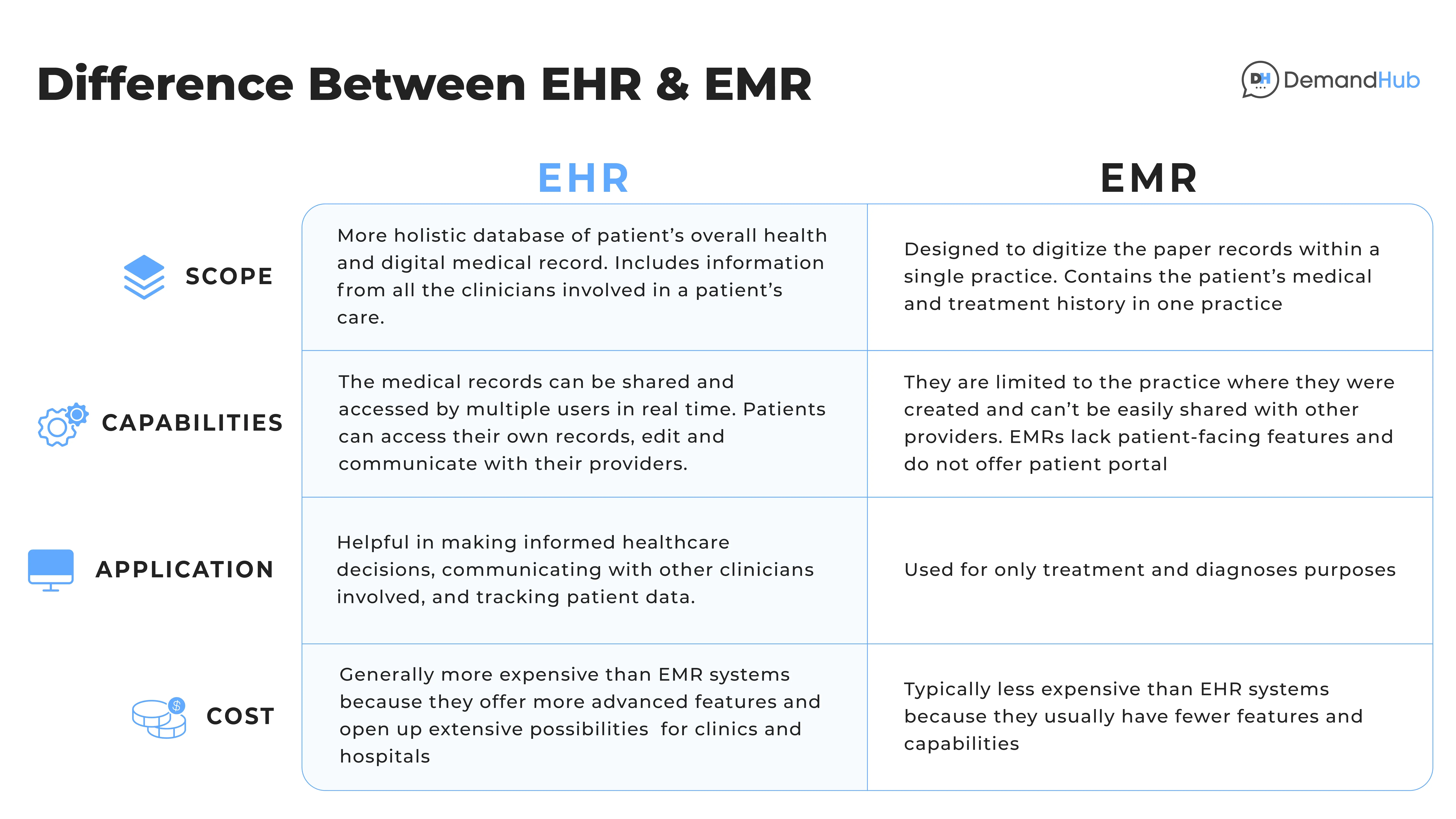
Key Factors to Consider When Choosing an EHR Management Platform
Picking the right EHR platform is a critical decision. It can greatly impact your practice’s efficiency, patient satisfaction, and overall success.
Consider the following key factors when making your choice:
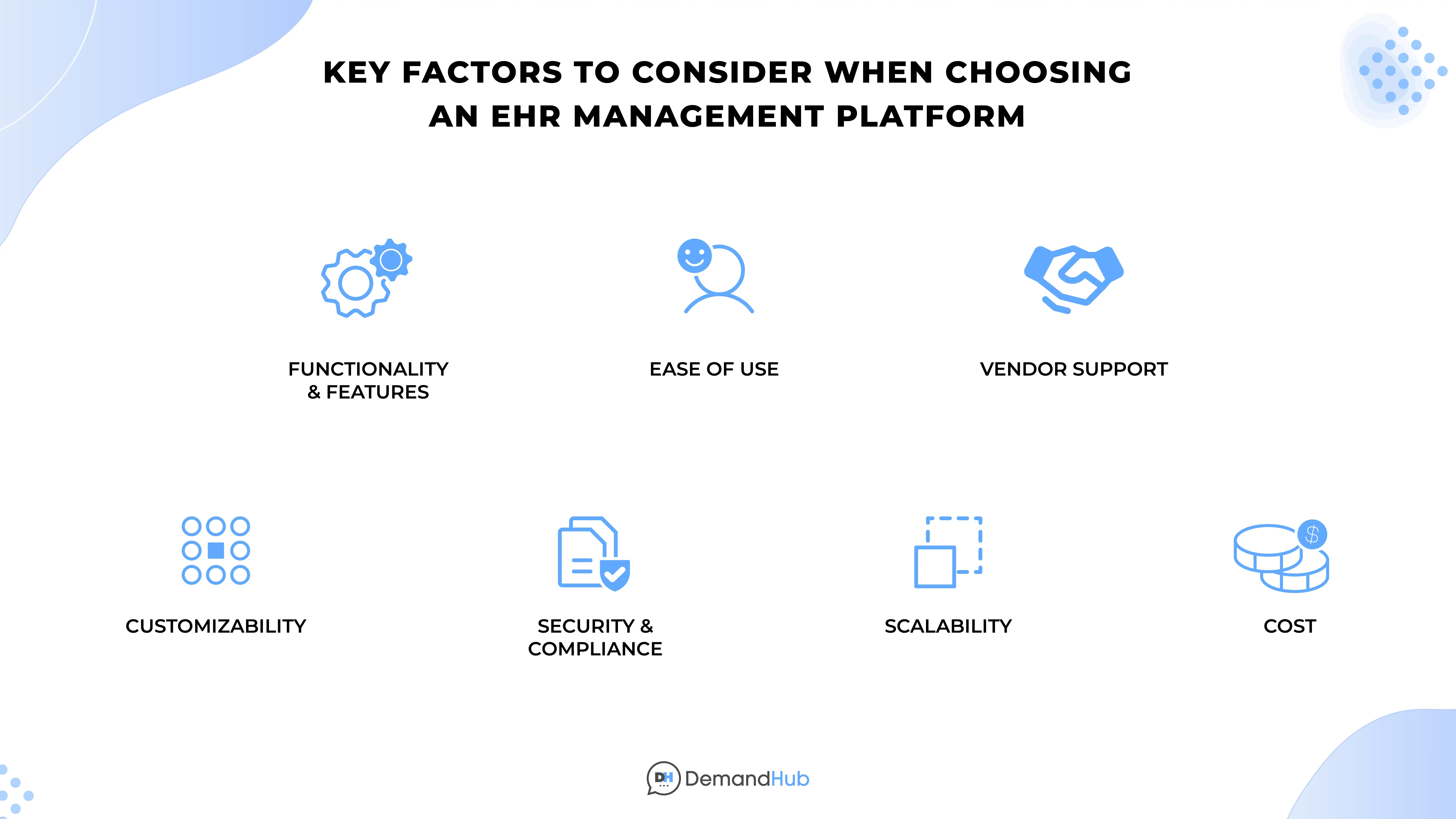
Functionality and Features
The platform must offer comprehensive features that meet your practice’s specific needs. This could include appointment scheduling, patient self-scheduling, automated reminders, customizable appointment types, and integration with other systems. Make sure the platform can handle all the tasks you need it to.
Ease of Use
A user-friendly platform will be easier for your team to adopt and use effectively. Look for intuitive navigation, clear instructions, and a clean, uncluttered interface.
Customizability
Every healthcare practice is unique, so a one-size-fits-all solution may not work for you. The platform should be customizable to fit your practice’s workflows, appointment types, and other specific needs.
Scalability
As your practice grows, your EHR platform should be able to grow with you. Look for a platform that can handle a growing number of patients and more complex operations as your needs evolve.
Cost
Estimate both the upfront and ongoing costs of the platform. This includes the cost of the software, implementation, training, and any ongoing maintenance or subscription fees.
Security and Compliance
The EHR platform must have robust security measures to protect patient data. It should also be compliant with healthcare regulations such as HIPAA.
Vendor Support
Good vendor support can make a big difference in your experience with the platform. Look for a vendor that offers reliable, responsive customer support to help you fix any issues.
By weighing these factors, you can select an EHR management platform that not only meets your current needs but can also adapt and grow with your practice.
7 EHR Platforms to Supercharge Your Healthcare Practice in 2024
Now, it’s time to turbocharge your healthcare practice with the power of technology. Here, we’ve curated a list of the top 7 EHR platforms that are revolutionizing the healthcare industry.
These platforms are designed to streamline operations, enhance patient care, and boost overall efficiency, providing you with the tools you need to take your practice to the next level.
Let’s dive in and explore these game-changing EHR platforms.
1. CareCloud
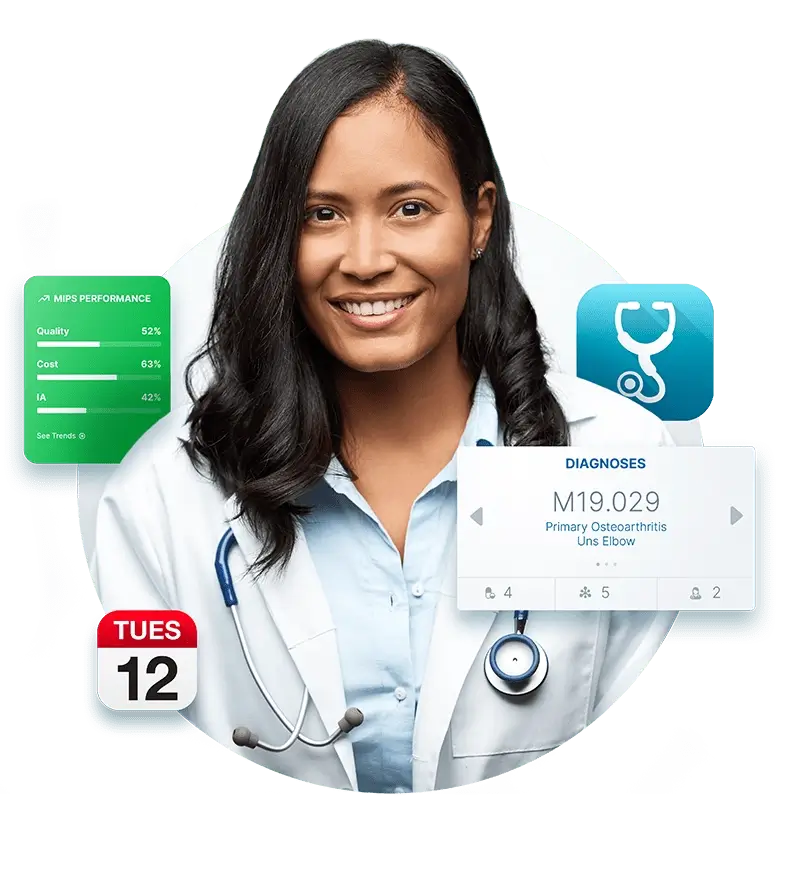
Image Source: CareCloud
CareCloud offers a complete suite of tools to help healthcare practices streamline processes and improve patient engagement. CareCloud offers assistance with appointment scheduling, billing, and collections, allowing you to save time and prioritize your patients.
2. DrChrono
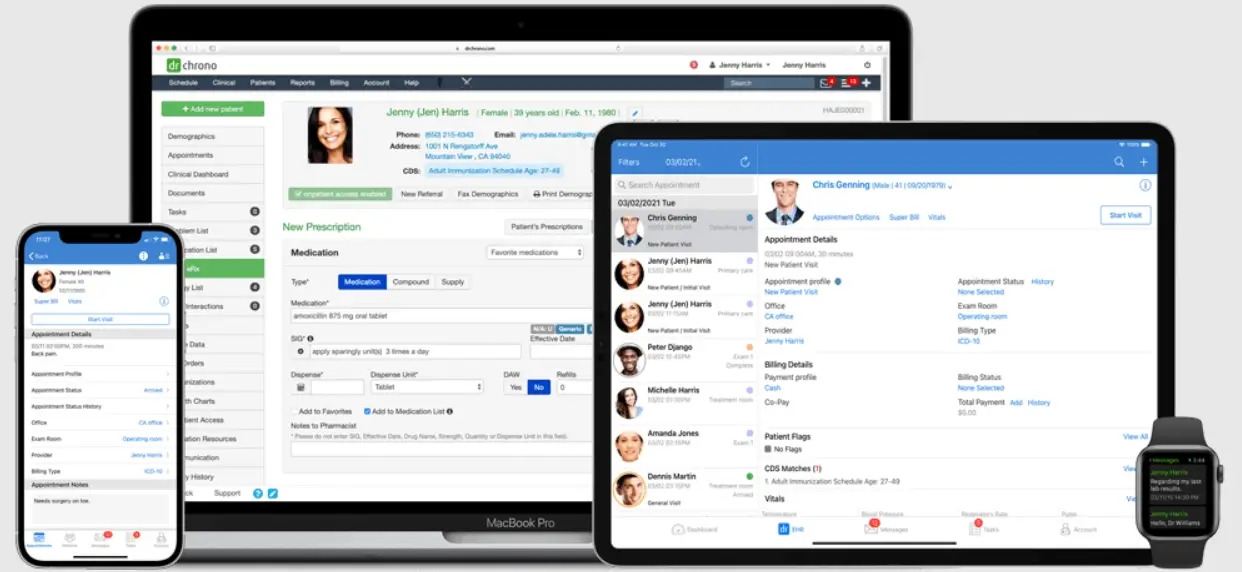
Image Source: DrChrono
DrChrono is a cloud-based platform with multiple functionalities to help healthcare practices manage their day-to-day operations. DrChrono can help you automate processes, attract new patients, and improve patient satisfaction with customizable options and multiple integrations.
One of the key benefits of DrChrono is its ability to integrate with existing systems. Integrating with your EHR and other systems can simplify processes and reduce manual work. 13.
3. AdvancedMD
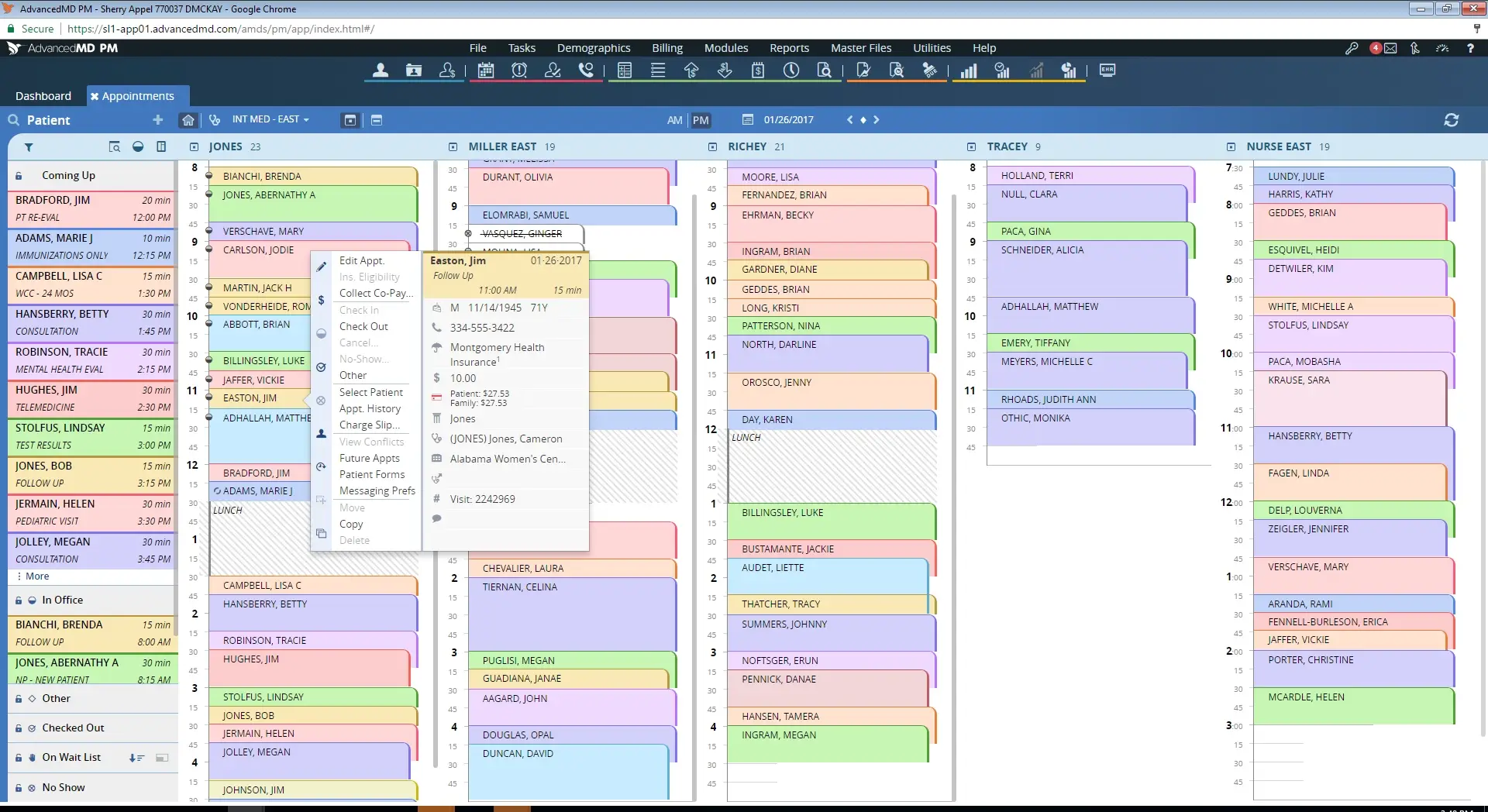
Image Source: AdvancedMD
AdvancedMD offers a cloud-based platform to help healthcare practices manage their day-to-day operations more efficiently. With its billing, scheduling, and patient management tools, AdvancedMD can help practices attract new patients and provide better care to their existing ones.
4. WebPT
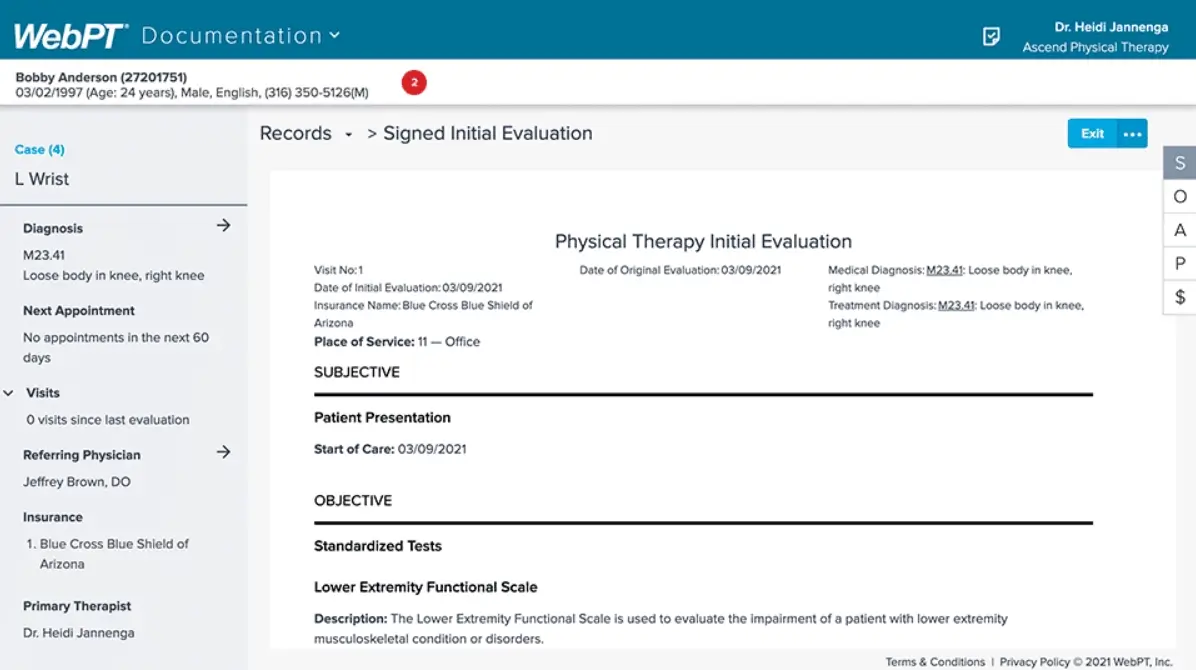
Image. Source: WebPT
WebPT is a leading electronic medical record (EMR) solution specifically designed for rehabilitation therapists. It’s a cloud-based system that caters to physical therapists, occupational therapists, and speech-language pathologists.
Besides electronic medical records (EMR), WebPT offers a home exercise platform, remote therapeutic monitoring, billing, and patient scheduling.
5. eClinicalWorks
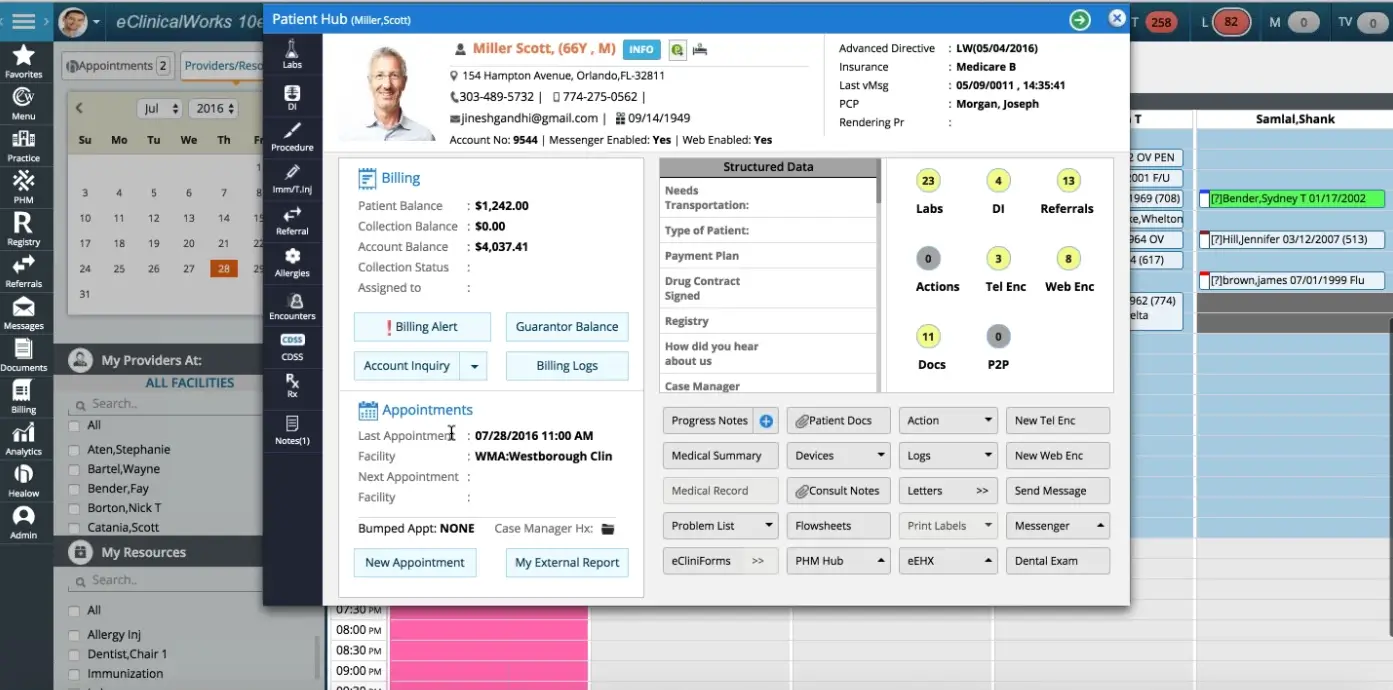
Image Source: eClinicalWorks
eClinicalWorks is a comprehensive electronic health record (EHR) and practice management solution. It streamlines the day-to-day operations of healthcare providers. It’s a cloud-based system that caters to a wide range of healthcare specialties and practice sizes, from solo practitioners to large multi-specialty groups.
6. ChiroTouch
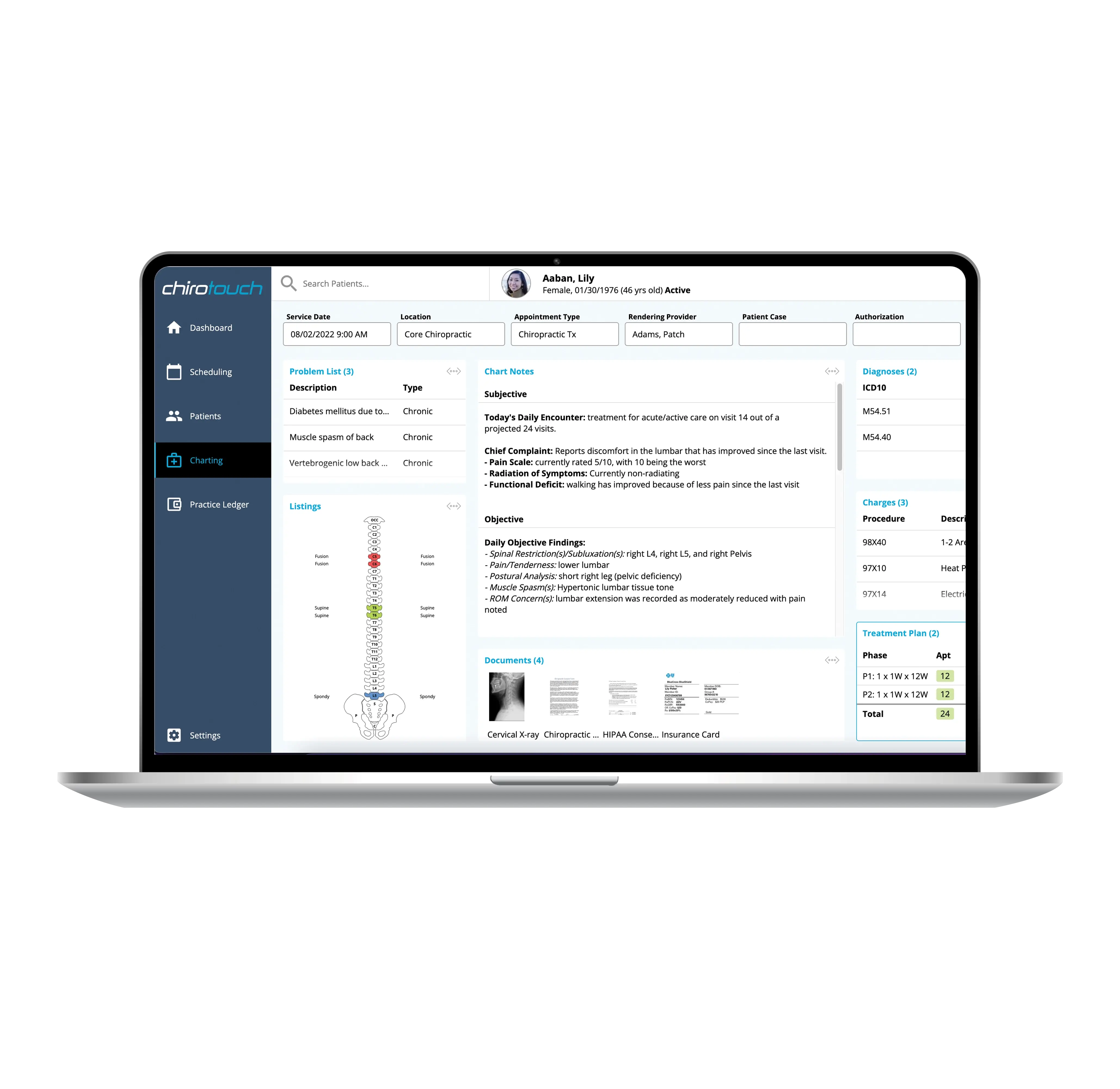
Image Source: ChiroTouch
ChiroTouch is a fully integrated, cloud-based electronic health record (EHR) and practice management software designed specifically for chiropractic practices. It offers tools to help chiropractors streamline operations, manage patient care, and improve services.
With its scheduling, billing, and patient management features, ChiroTouch can help chiropractors grow their practices and provide better patient care.
7. NueMD
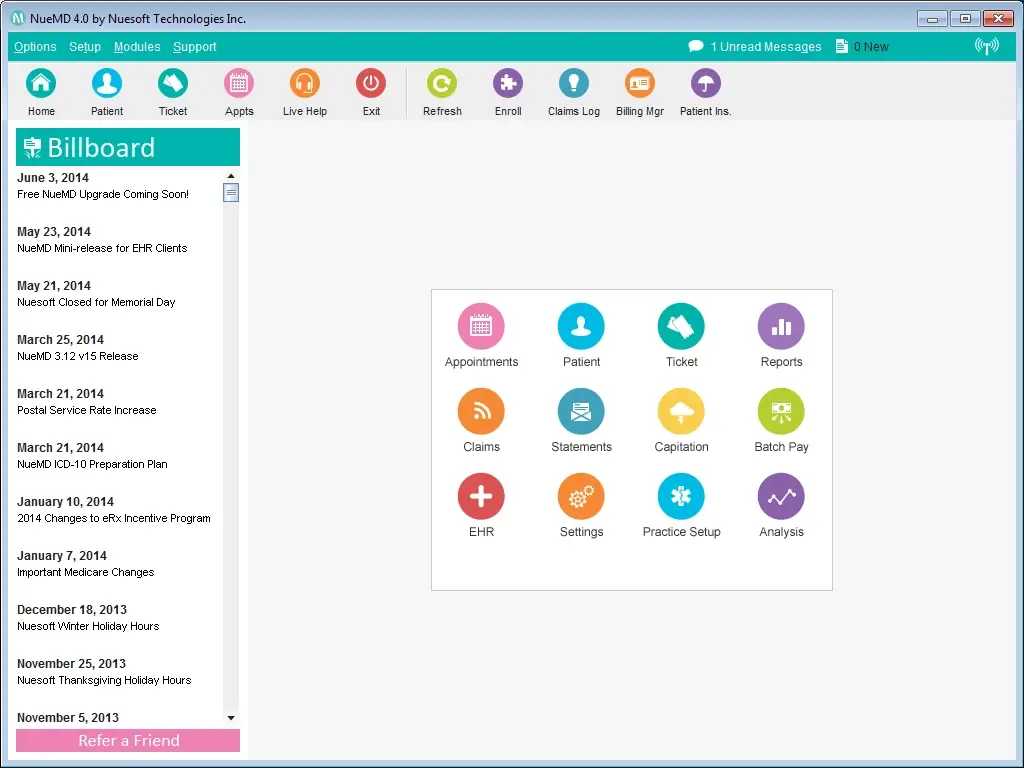
Image Source: NueMD
NueMD is a cloud-based medical billing and electronic health record (EHR) solution for small to midsize practices across various medical specialties. It aims to streamline the day-to-day operations of healthcare providers, making it easier to manage patient information, billing, and scheduling.
Picking a system can be challenging
EHR platforms are transforming modern healthcare. They digitize patient records, streamline operations, and deliver exceptional patient care.
But to effectively harness the power of these platforms, integration with a robust patient experience platform like DemandHub is key.
DemandHub is more than just a patient engagement platform. It’s a tool that seamlessly integrates with various EHR platforms to streamline online scheduling, request reviews, manage patient records, and optimize practice operations. It’s about creating a cohesive, efficient, and patient-centered practice.
So why wait? Take the first step towards supercharging your healthcare practice.
Book your free demo with DemandHub today and learn how we can help you unlock the full potential of your EHR platform. It’s time to elevate your practice and deliver the exceptional care your patients deserve.
Frequently Asked Questions (FAQs) About EHR Platforms
What is an EHR platform?
An EHR (Electronic Health Record) platform is a digital system that healthcare providers use to manage patient data. It includes the patient’s medical history, diagnoses, medications, treatment plans, immunization dates, allergies, radiology images, and laboratory and test results.
What is the Difference Between an EHR and an EMR?
An EMR (Electronic Medical Record) is a digital copy of a patient’s chart in a single doctor’s office. At the same time, an EHR is a more comprehensive record of the patient’s overall health. It includes information from all the clinicians involved in a patient’s care.
What are the Benefits of Using an EHR Platform?
EHR platforms can streamline operations, enhance patient care, and improve efficiency. They can also reduce paperwork, eliminate duplicate tests, and improve scheduling.
What Should I Consider When Choosing an EHR Platform?
When choosing an EHR platform, consider factors such as functionality and features, ease of use, customizability, scalability, cost, security and compliance, and vendor support.
Can Other Systems Integrate With EHR Platforms?
Yes, many EHR platforms can be integrated with other systems, such as practice management platforms, billing systems, and laboratory systems.
What are Some Types of EHR Platforms?
There are several types of EHR platforms, including practice management EHR software, specialty EHR software, inpatient EHR software, outpatient EHR software, cloud-based EHR software, and on-premise EHR software.
Is My Data Secure on an EHR Platform?
EHR platforms have robust security measures in place to protect patient data. They are compliant with healthcare regulations such as HIPAA. However, checking with the specific vendor about their security measures is always essential.




